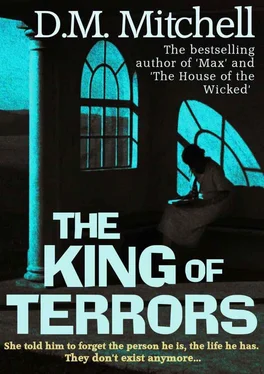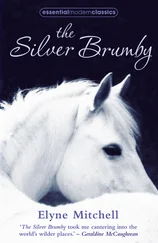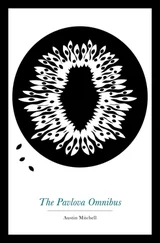D. Mitchell - The King of Terrors
Здесь есть возможность читать онлайн «D. Mitchell - The King of Terrors» весь текст электронной книги совершенно бесплатно (целиком полную версию без сокращений). В некоторых случаях можно слушать аудио, скачать через торрент в формате fb2 и присутствует краткое содержание. Жанр: Триллер, на английском языке. Описание произведения, (предисловие) а так же отзывы посетителей доступны на портале библиотеки ЛибКат.
- Название:The King of Terrors
- Автор:
- Жанр:
- Год:неизвестен
- ISBN:нет данных
- Рейтинг книги:3 / 5. Голосов: 1
-
Избранное:Добавить в избранное
- Отзывы:
-
Ваша оценка:
- 60
- 1
- 2
- 3
- 4
- 5
The King of Terrors: краткое содержание, описание и аннотация
Предлагаем к чтению аннотацию, описание, краткое содержание или предисловие (зависит от того, что написал сам автор книги «The King of Terrors»). Если вы не нашли необходимую информацию о книге — напишите в комментариях, мы постараемся отыскать её.
The King of Terrors — читать онлайн бесплатно полную книгу (весь текст) целиком
Ниже представлен текст книги, разбитый по страницам. Система сохранения места последней прочитанной страницы, позволяет с удобством читать онлайн бесплатно книгу «The King of Terrors», без необходимости каждый раз заново искать на чём Вы остановились. Поставьте закладку, и сможете в любой момент перейти на страницу, на которой закончили чтение.
Интервал:
Закладка:
This box, this mere container, was all that was left of his grandfather; the only physical testament to a life once lived. His house, sold, lived in by others; his clothes, given away to the poor; his small and worthless collection of seaside pottery sent to the local tip; his meagre life savings shared out and quickly spent. All that remained of his grandfather, Thomas Rayne, one-time soldier, one-time famous detective, one-time dotty old man, all but forgotten and living alone in his quiet suburban semi, was this battered, scarred and scuffed old trunk pasted with fading labels from faraway places.
Charles Rayne rested his bandaged chin on his bandaged hand without thinking and winced at the pain. Today had been particularly bad, his skin afire, the weeping lesions and sores each as painful as if someone had been stubbing cigarettes out on his flesh. It was at times like this that he wondered what crime he had committed to be singled out for such punishment. Yet he was aware that today’s punishment was something he’d brought on himself, because he had dared to step out into the sunshine. He’d been unable to take the sight of closed curtains, knowing that outside the summer sun shone strong, and a sort of madness had taken over his fourteen-year-old mind. He went for a walk onto the moor; clambered up the huge natural rock edifice that was Mam Tor, to stand breathlessly on top of the high, sheer cliff of shifting black shale and feel the wind buffet him, as if it said he should not be there and tried to force him back down.
Tears stung his eyes, the bright light at once blinding, beautiful and terrifying. Hope Valley lay stretched out like a model far below. Hope Valley. How ironic. He should not do this; everything inside him was screaming for him to turn back and take shelter inside the safety and gloom of his curtained bedroom. He knew he would suffer for this. But he didn’t care. He desperately needed to see the green of the summer grass, the pure blue of the sky, to witness birds wheeling freely many hundreds of feet below him, unconstrained by walls and fear. He didn’t care if he shrivelled up and died. Life had become pointless. He might as well jump from the cliff and end his suffering.
Charles Rayne was unlike other boys of his age. He was unlike anyone he knew. He could not go out in daylight.
There was a time — it seemed so, so long ago now — when he was normal, like any other kid, nothing special to separate him out. Then at ten years old it was as if a switch had been flicked on inside him. His body began to rebel. The skin on his face, arms and legs blistered as if he’d been attacked by a blowtorch, and he fell dreadfully ill. For a while they feared for his life, and struggled to find a reason for what was happening to him. They bathed his ruptured skin and scratched their collective heads. He was obviously allergic to something. What had he eaten? They banned certain foods to no avail. Eventually it dawned on them; he could not go out in daylight. When they kept him inside, sheltered from even the tiniest chinks of light, he recovered. Never fully; his skin remained sensitive to the touch and was prone to blistering without reason. But now they knew any exposure to daylight caused a reaction. For young Charles that wasn’t the worst of it. He screamed the first time he went to the toilet and saw his urine had turned a deep red, almost the colour of a fresh bruise. He thought he was dying.
So Charles was kept indoors, his mother employing private tutors who had to work by the light of lamps. He could no longer go out onto the high moors that surrounded the village of Elldale, or play in one of the many freezing streams that gushed down the craggy hillsides. Instead, he played with his friends in a strange twilight world, till they exchanged this gloomy netherworld for the lure of the outside. They gave his condition a fancy name — porphyric hemophilia. Some people weren’t so sure, but they felt they needed to label it with something. He was bounced eagerly from one specialist to another by his mother, desperate to find a cure and secretly blaming herself for her son’s condition. She even briefly considered it was something to do with eating too much beetroot whilst she’d been pregnant with him, hence his purple urine, but they reassured her politely that it wasn’t so. It didn’t entirely convince her and she remained riddled with guilt.
He became something of a medical curiosity, told that one in half a million people might suffer with some form of the condition. It did not make him feel better; it made him feel he’d been purposely singled out, imagining God’s giant index finger reaching down through puffy white clouds and a booming voice saying: ‘This is the boy. Let’s make it him!’ He was forever being prodded, poked, swabbed, injected, stripped, bandaged, and talked about as if he weren’t in the room. Then they took him to that horrible room, laid him gently on the bed, his reassuring mother almost tearful and saying it was for his own good. They attached something to his head, put something in his mouth and told him to bite on it. He had no idea what was happening. The electric shock sent his body into convulsions. It appeared to last an age and then he passed out. But it did not make his condition any better.
And yet he endured all this because he wanted to be cured of the thing and to go out and play in the sunlight with his friends again. He became so lonely it screwed up his insides. That’s when he became attached to his grandfather Tom.
He was one of the few people to visit him, brought over by his mother for the occasional dinner. He liked Grandad Tom. They shared an unspoken bond. Grandad Tom lived all by himself. His wife had died a long, long time ago and he had never remarried. He’d once been a famous detective, his mother (Grandad Tom’s daughter) said, speaking of him as if the man were long-dead. She would often ask her son to excuse his grandfather’s erratic and often eccentric behaviour, putting it down to age and something not being quite right up here, pointing with a flash of her delicate finger to her delicate temple. His visits were reluctant, on his part, and dutiful on hers. He was always in a hurry to get off back to his house and his research, to his special ‘project’ as he liked to call it, and he would not settle because of its constant demands on his limited attention.
‘He does go on about the dratted thing,’ his mother sighed. ‘Can’t he simply give it a rest, just once? It’s not so much to ask.’
‘The old man’s not been himself for a long time,’ defended Charles’ father carefully. ‘At least he’s happy,’ he said. ‘It gives him something to do, to concentrate the mind upon. That’s no bad thing, considering.’
‘He’s so obsessed with the thing,’ she said. Charles noted how she always sounded upset and angry all at once. ‘He lets the thing prey on his mind when he should have let it go. After all, there’s nothing he can do about it now, is there? Some things are never resolved. That’s a fact of life.’
‘Well the old boy thinks he has an answer to the case, finally,’ his father chuckled, ever the umpire in these things and wanting to see fair play all round.
‘An answer? The answer he refuses to tell anyone about? He shuts himself away with his dusty old books and maps and things and every day he steps further and further away from the man I knew and loved. Doesn’t he know I have enough troubles with him upstairs? It’s not fair. It’s just not fair!’
And so the conversation downstairs would ebb and flow, bubble into hearing one minute and drop into a simmering, formless moan the next. She didn’t realise, Charles thought, how easily they could be heard through the thin downstairs ceiling. He remembered how his grandfather would sit on the bed beside him, whilst below her mother hammered out her feelings, her frustrations, her fears. He would show no sign that what was said upset him, or that he even listened or understood. Instead he’d tell Charles about his project, and Charles had a willing ear.
Читать дальшеИнтервал:
Закладка:
Похожие книги на «The King of Terrors»
Представляем Вашему вниманию похожие книги на «The King of Terrors» списком для выбора. Мы отобрали схожую по названию и смыслу литературу в надежде предоставить читателям больше вариантов отыскать новые, интересные, ещё непрочитанные произведения.
Обсуждение, отзывы о книге «The King of Terrors» и просто собственные мнения читателей. Оставьте ваши комментарии, напишите, что Вы думаете о произведении, его смысле или главных героях. Укажите что конкретно понравилось, а что нет, и почему Вы так считаете.












